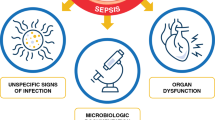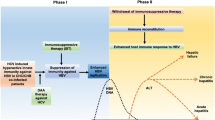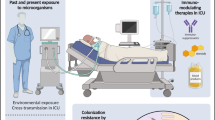Abstract
Background
Treatment with systemic corticosteroids is often used for acute liver failure (ALF), but this has increased the number of profoundly immunocompromised patients and cases of opportunistic infection.
Methods
Between January 2007 and December 2012, all patients (n = 51) referred to the Chiba University Hospital for treatment of ALF were studied. Patients with prothrombin activity of 40 % or less of the standardized values were defined as having ALF. Patient age, sex, cause of ALF, alanine aminotransferase and total bilirubin levels, prothrombin activity and total amount of corticosteroid were analyzed to determine the factors associated with the occurrence of opportunistic infection.
Results
Opportunistic infections occurred in 21.6 % (n = 11) of ALF patients. Thirty-five patients underwent systemic corticosteroid therapy, and 31.4 % of those patients showed opportunistic infections. Cytomegalovirus (n = 9, 81.8 %) and Pneumocystis jiroveci (n = 6, 54.5 %) were the microorganisms frequently suspected as the causes of opportunistic infection. In 7 (63.6 %) of the 11 cases of opportunistic infection, 2 or more species of microorganism were detected. Seven patients (63.6 %) with opportunistic infection were cured by treatment. Cox regression analysis for the patients who underwent systemic corticosteroid therapy steroid treatment revealed that age over 52 years (compared to younger patients: odds ratio = 9.62, 95 % confidence interval = 1.22–76.9) was only the predictive factor for the occurrence of opportunistic infection.
Conclusion
Opportunistic infections are not rare in ALF patients, and the appropriate diagnosis and treatment of these infections are critical during ALF treatment.

Similar content being viewed by others
Abbreviations
- ALF:
-
Acute liver failure
- PSL:
-
Prednisolone
- ALT:
-
Alanine aminotransferase
- T-Bil:
-
Total bilirubin
- SD:
-
Standard deviation
- OR:
-
Odds ratio
- CI:
-
Confidence interval
- IU:
-
International units
- RA:
-
Rheumatoid arthritis
References
Czaja AJ, Freese DK. Diagnosis and treatment of autoimmune hepatitis. Hepatology 2002;36:479–497
Fujiwara K, Yasui S, Yonemitsu Y, Fukai K, Arai M, Imazeki F, et al. Efficacy of combination therapy of antiviral and immunosuppressive drugs for the treatment of severe acute exacerbation of chronic hepatitis B. J Gastroenterol 2008;43:711–719
Fujiwara K, Yasui S, Yonemitsu Y, Mikata R, Arai M, Kanda T, et al. Efficacy of high-dose corticosteroid in the early stage of viral acute liver failure. Hepatol Res 2013; doi:10.1111/hepr.12148
Vaquero J, Polson J, Chung C, Helenowski I, Schiodt FV, Reisch J, et al. Infection and the progression of hepatic encephalopathy in acute liver failure. Gastroenterology 2003;125(3):755–764
Smith JA, Kauffman CA. Pulmonary fungal infections. Respirology 2012;17:913–926
Eizuru Y, Minematsu T, Minamishima Y, Ebihara K, Takahashi K, Tamura K, et al. Rapid diagnosis of cytomegalovirus infection by direct immunoperoxidase staining with human monoclonal antibody against an immediate early antigen. Microbiol Immunol 1991;35:1015–1022
Arai M, Imazeki F, Yonemitsu Y, Kanda T, Fujiwara K, Fukai K, et al. Opportunistic infection in the patients with acute liver failure: a report of three cases with one fatality. Clin J Gastroenterol 2009;2:420–424
Trikudanathan S, McMahon GT. Optimum management of glucocorticoid-treated patients. Nat Clin Pract Endocrinol Metab 2008;4:262–271
Ford AC, Peyrin-Biroulet L. Opportunistic infections with anti-tumor necrosis factor-α therapy in inflammatory bowel disease: meta-analysis of randomized controlled trials. Am J Gastroenterol 2013;108(8):1268–1276
Hoyo I, Sanclemente G, Cervera C, Cofán F, Ricart MJ, Perez-Villa F, et al. Opportunistic pulmonary infections in solid organ transplant recipients. Transpl Proc 2012;44:2673–2675
Rolando N, Harvey F, Brahm J, Philpott-Howard J, Alexander G, Gimson A, et al. Prospective study of bacterial infection in acute liver failure: an analysis of fifty patients. Hepatology 1990;11:49–53
Rolando N, Philpott-Howard J, Williams R. Bacterial and fungal infection in acute liver failure. Semin Liver Dis 1996;16:389–402
Ware AJ, Jones RE, Thorey JW, Combes B. A controlled trial of steroid therapy in massive hepatic necrosis. Am J Gastroenterol 1974;62:130–133
Redeker AG, Schweitzer IL, Yamahiro HS. Randomization of corticosteroid therapy in fulminant hepatitis. N Engl J Med 1976;294:728–729 letter
Randomized trial of steroid therapy in acute liver failure: a report from the European Association for the Study of the Liver. Gut 1979;20:620–623
Rakela J, Mosley JW, Edwards VM, Govindarajan S, Alpert E, The Acute Hepatic Failure Study Group. Double-blinded, randomized trial of hydrocortisone in acute hepatic failure. Dig Dis Sci 1991;36:1223–1228
Oketani M, Ido A, Nakayama N, Takikawa Y, Naiki T, Yamagishi Y, et al. Etiology and prognosis of fulminant hepatitis and late-onset hepatic failure in Japan: Summary of the annual nationwide survey between 2004 and 2009. Hepatol Res 2013;2:97–105
Rolando N, Gimson A, Wade J, Philpott-Howard J, Casewell M, Williams R. Prospective controlled trial of selective parenteral and enteral antimicrobial regimen in fulminant liver failure. Hepatology 1993;17:196–201
Salmerón JM, Titó L, Rimola A, Mas A, Navasa MA, Llach J, et al. Selective intestinal decontamination in the prevention of bacterial infection in patients with acute liver failure. J Hepatol 1992;14:280–285
Hughes WT, Armstrong D, Bodey GP, Bow EJ, Brown AE, Calandra T, et al. 2002 guidelines for the use of antimicrobial agents in neutropenic patients with cancer. Clin Infect Dis 2002;34:730–751
Pizzo PA, Robichaud KJ, Gill FA, Witebsky FG. Empiric antibiotic and antifungal therapy for cancer patients with prolonged fever and granulocytopenia. Am J Med 1982;72:101–111
EORTC International Antimicrobial Therapy Cooperative Group. Empiric antifungal therapy in febrile granulocytopenic patients. Am J Med 1989;86(6 Pt 1):668–672
Iriyama N, Matsukawa Y, Miura K, Inomata H, Hirabayashi Y, Hatta Y, et al. Efficacy and safety of antifungal prophylaxis with oral itraconazole solution among patients receiving corticosteroids: who should be given prophylaxis? J Infect Chemother 2011;17:744–749
Thomas CF Jr, Limper AH. Pneumocystis pneumonia. N Engl J Med 2004;350:2487–2498
Alberti-Flor JJ, Hernandez ME, Ferrer JP, Howell S, Jeffers L. Fulminant liver failure and pancreatitis associated with the use of sulfamethoxazole-trimethoprim. Am J Gastroenterol 1989;84:1577–1579
Zaman F, Ye G, Abreo KD, Latif S, Zibari GB. Successful orthotopic liver transplantation after trimethoprim-sulfamethoxazole associated fulminant liver failure. Clin Transpl 2003;17:461–464
Sarkar D, Fisher PB. Molecular mechanisms of aging-associated inflammation. Cancer Lett 2006;236:13–23
Caruso C, Lio D, Cavallone L, Franceschi C. Aging, longevity, inflammation, and cancer. Ann N Y Acad Sci 2004;1028:1–13
Chung HY, Cesari M, Anton S, Marzetti E, Giovannini S, Seo AY, et al. Molecular inflammation: underpinnings of aging and age-related diseases. Ageing Res Rev 2009;8:18–30
Komano Y, Harigai M, Koike R, Sugiyama H, Ogawa J, Saito K, et al. Pneumocystis jiroveci pneumonia in patients with rheumatoid arthritis treated with infliximab: a retrospective review and case-control study of 21 patients. Arthr Rheum 2009;61:305–312
Compliance with ethical requirements and Conflict of interest
The study was reviewed and approved by the institutional review board of Chiba University School of Medicine. All procedures followed were in accordance with the ethical standards of the responsible committee on human experimentation (institutional and national) and with the Helsinki Declaration of 1975, as revised in 2008. Informed consent was obtained from all patients for being included in the study. The authors declare that they have no conflict of interest.
Author information
Authors and Affiliations
Corresponding author
Rights and permissions
About this article
Cite this article
Arai, M., Kanda, T., Yasui, S. et al. Opportunistic infection in patients with acute liver failure. Hepatol Int 8, 233–239 (2014). https://doi.org/10.1007/s12072-013-9514-4
Received:
Accepted:
Published:
Issue Date:
DOI: https://doi.org/10.1007/s12072-013-9514-4




